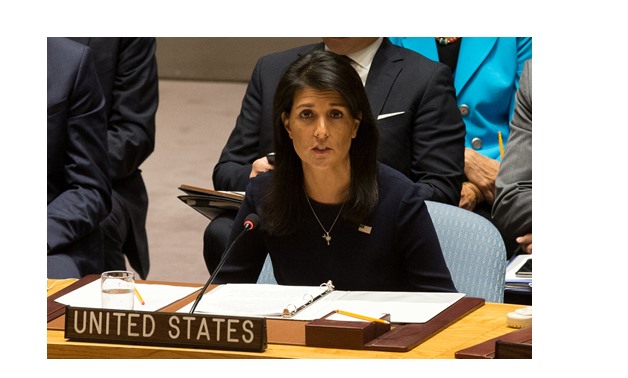
U.S. Ambassador to the United Nations Nikki Haley delivers remarks during a meeting by the United Nations Security Council on North Korea at the U.N. headquarters in New York City, U.S., September 4, 2017. REUTERS/Joe Penney
UNITED NATIONS- 4 Sep 2017: The United States wants the United Nations Security Council to vote next Monday to impose "the strongest possible" sanctions on North Korea over its sixth and largest nuclear test, U.S. Ambassador to the United Nations Nikki Haley said on Monday.
North Korea said it tested an advanced hydrogen bomb for a long-range missile on Sunday, prompting global condemnation and a U.S. warning of a "massive" military response if it or its allies were threatened.
China's U.N. Ambassador Liu Jieyi pushed North Korea on Monday "to stop taking actions that are wrong, deteriorating the situation and not in line with its own interests and truly return to the track of solving the issue through dialogue."
Haley said the 15-member council would negotiate a draft resolution this week. She described North Korean leader Kim Jong Un as "begging for war" and that while the United States doesn't want conflict, "our country's patience is not unlimited."
"Enough is enough," Haley told the council. "Only the strongest sanctions will enable us to resolve this problem through diplomacy."
Since 2006, the Security Council has unanimously adopted eight resolutions ratcheting up sanctions on North Korea over its ballistic missile and nuclear programs. Haley said the council's incremental approach to sanctions had not worked.
The council last month imposed new sanctions over North Korea's two long-range missile launches in July.
The resolution aimed to slash by a third Pyongyang's $3 billion annual export revenue by banning exports of coal, iron, lead and seafood.
'COOL HEAD'
Diplomats have said the council could now consider banning Pyongyang's textile exports and the country's national airline, stop supplies of oil to the government and military, prevent North Koreans from working abroad as well as add top officials to a blacklist to subject them to an asset freeze and travel ban.
A resolution needs nine votes in favor and no vetoes by the United States, Britain, France, Russia or China to pass. Typically, China and Russia only view a test of a long-range missile or a nuclear weapon as a trigger for U.N. sanctions.
China has not publicly said it will back new sanctions. Russian U.N. Ambassador Vassily Nebenzia said he would consider a U.S. draft resolution but questioned whether further sanctions would make a difference.
"Whatever measures we are planning now, I'm not sure that they will influence the other side to abandon what they have been doing. This is not the way to get parties at the table ... to seek for a political solution," he told reporters.
He told the council there was an urgent need to "maintain a cool head" and avoid escalating tensions, and called for a return to dialogue, including "by leveraging mediation efforts" of U.N. Secretary-General Antonio Guterres.
Both Russia and China pushed their proposal to kick-start talks with a joint suspension of North Korea's ballistic missile and nuclear programs and the military exercises by the United States and South Korea. Liu said he hoped it would be seriously considered by the parties.
"The idea that some have suggested of a so-called freeze-for-freeze is insulting," Haley told the council. "When a rogue regime has a nuclear weapon and an ICBM (intercontinental ballistic missile) pointed at you, you do not take steps to lower your guard. No one would do that. We certainly won't."
SANCTION TARGETS
Through sanctions, the Security Council has tried to choke off funding and support for North Korea's ballistic missile and nuclear programs, though some Western states have expressed doubt about Russia and China's commitment to implement them.
Haley said in July that cutting off oil supplies to the North Korean government and military was an option.
China supplies most of North Korea's crude. According to South Korean data, Beijing supplies roughly 500,000 tonnes of crude oil annually. It also exports 200,000 tonnes of oil products, according to U.N. data.
The U.N. resolution adopted last month capped the number of North Koreans working abroad at the current level. Diplomats said a new resolution could impose a complete ban.
Some diplomats estimate that between 60,000 and 100,000 North Koreans work abroad. A U.N. human rights investigator said in 2015 that North Korea was forcing more than 50,000 people to work abroad, mainly in Russia and China, earning between $1.2 billion and $2.3 billion a year.
The council could ban textiles, which were North Korea's second-biggest export after coal and other minerals in 2016, totaling $752 million, according to data from the Korea Trade-Investment Promotion Agency (KOTRA). Nearly 80 percent of the textile exports went to China.
The military-controlled airline, Air Koryo, could be banned. It flies to Beijing and a few other cities in China, including Dandong, the main transit point for trade between the two countries. It also flies to Vladivostok in Russia, but flights to Bangkok, Kuala Lumpur and Kuwait have ended.


Comments
Leave a Comment